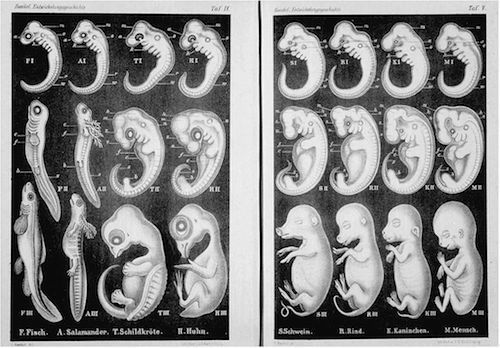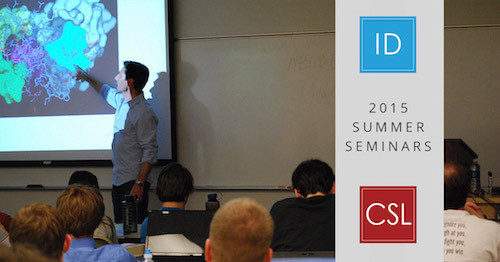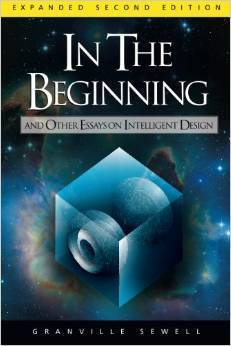Discovery Institute's Blog, page 172
April 5, 2015
What Could Be More Appropriate on Easter? Jerry Coyne Challenges Francis Collins on Metaphysics

National Institutes of Health director Francis Collins, who is a devout Christian, did an interview recently with National Geographic about his faith and his science. Predictably, Jerry Coyne, an atheist biologist from the University of Chicago, took exception to some of Collins's answers about the compatibility of faith in God and science.
Collins:
[Question asked of Collins] Are science and religion compatible?
I am privileged to be somebody who tries to understand nature using the tools...
April 4, 2015
AP’s Pro-Animal Rights Bias Is Revealed in Stylebook Change

Animal rights and animal welfare are two different concepts. The former is an ideology that creates an explicit moral equivalence or equality between animals and humans. In this view, what is done to an animal must be judged in the same manner as if done to a human being, or one is a "speciesist." Hence, cattle ranching is an equivalent evil to slavery.
Animal welfare, on the other hand, deals with setting humane treatment standards and preventing abuse. Animal welfare is a duty imposed by...
April 3, 2015
On Science, Passivity or Independence? A Conversation that Needs to Happen Among Conservatives
When it comes to questions in science with major political, cultural, or philosophical implications, are you or are you not allowed to think for yourself and draw your own conclusions? Does doing so violate norms of intellectual hygiene?
Writing today in The American Spectator, Christopher Goins analyzes a recent speech Discovery Institute's John West gave at the Heritage Foundation on "Scientism in the Age of Obama." The topic is elaborated in the expanded version of West's book Darwin Day...
Haeckel's Fraudulent Embryo Drawings Are Pervasive in Biology Textbooks -- Here's a List

Recently a colleague asked for a list of textbooks that use Ernst Haeckel's fraudulent embryo drawings, which since the 19th century have been used to support the hypothesis of universal common ancestry. We've covered this many times over the years (see here, here, here, here, here, here, here, here, here, here, here, or here). Yet somehow we've never tried to gather into a single list many (or perhaps nearly all) known examples of textbooks in recent memory that use Haeckel's drawings. Our...
Evolutionary Conundrum: Is Religion a Useful, Useless, or Harmful Adaptation?

Contrary to what one might glean from popular science news, traditionally religious people in North America areless likely, not more likely, to believe in superstitions. That is possibly because widely held religious views in North America tend to emphasize law-based explanations for events rather than chance-based ones. They are more likely to credit rational than irrational factors.
Law-based or rational explanations do not exclude miracles by definition. Miracles, if they occur, can be ac...
April 2, 2015
What Should Politicians Say When Asked About Evolution?
I spoke recently to the Faith and Law group on Capitol Hill in D.C., a regular meeting of congressional staffers. At their request, I addressed the topic: "What Should Politicians Say When Asked About Evolution?"
As you will no doubt guess, my talk was inspired by the media attention surrounding Scott Walker's handling of a question about evolution on a visit to the UK. When a British reporter asked Governor Walker "Do you believe in evolution?" he answered by saying: "I'm going to punt on t...
In Biology as in Technology, Similarities Do Not Prove the Absence of Intelligent Design

Editor's note: The following is excerpted from the new expanded edition of Granville Sewell's book In the Beginning: And Other Essays on Intelligent Design (Discovery Institute Press). References for cited works are given in this book. ENV contributor Dr. Sewell is Professor of Mathematics at the University of Texas El Paso. He has written three books on numerical analysis, and is the author of a widely used finite element computer program.
Carnegie Council Pushes "Nature Rights"

Too few people appreciate how profoundly, if subtly,major foundations with their wealth impact our society and culture -- often not for the better. When we find the foundations pushing a meme, it needs to be taken very seriously.
Advocacy for "nature rights" has now reached that level. An article in theCarnegie Council'sjournal Policy Innovations takes the issue very seriously -- and supports its implementation. That's no small matter.
It's a long piece, and I can't respond to the whole thin...
Another Paper with the Imprimatur of the National Academy of Sciences Glosses Over the Cambrian Explosion with Verbiage

Won't somebody, somewhere in a major journal really tackle the greatest problem of the Cambrian explosion -- the origin of new genetic information? Stephen Meyer's book Darwin's Doubt has been out for almost two years now. Evolutionary paleontologists surely know about him and his book, but once again, PNAS has published another paper that glosses over the problem that Meyer raises. (See here for a previous outing.)
If the authors Lin Na and Wolfgang Kiessling haven't heard about it over th...
April 1, 2015
The Deadline for Summer Seminar Applications Is Less than a Week Away -- Please Help Support Our Students!

In the words of the poet Pablo Neruda, "You can cut all the flowers, but you cannot keep spring from coming." This saying holds true in nature but in scholarship -- and science -- as well.
It is the crucial mission of theCenter for Science & Cultureto breathe fresh life into scientific and academic endeavors, especially the understanding of biological origins. The importance of this work to our culture, and the progress we are making, is attested to daily here at Evolution News & Views and e...
Discovery Institute's Blog
- Discovery Institute's profile
- 15 followers





